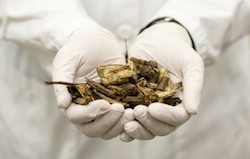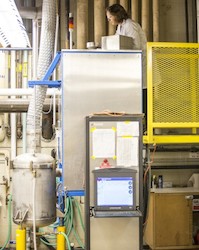New research from the University of Washington is laying the foundation to use woody biomass from poplar trees into sustainably produced biofuels and biochemicals. A five-year $40 million dollar study funded by the U.S. Department of Agriculture (USDA) is in its last year and results will seed a wood-based cellulosic ethanol production facility.

Poplar materials, including bark, leaves and wood, are used to make cellulosic ethanol.Dennis Wise/University of Washington
ZeaChem, one of the industry partners in the study, is moving ahead with plans to build a commercial production facility in Boardman, Oregon, in 2016 that will produce cellulosic ethanol and biochemicals from poplar trees grown specially for those industries.
“We’ve established that poplar is a viable and sustainable feedstock for the production of fuels and bio-based chemicals,” said Rick Gustafson, a UW professor of bioresource science and engineering, who leads the project. “We’ve provided fundamental information that our industry partners can use to convince investors that production of fuels and chemicals from poplar feedstock is a great investment.”
The research team is known as the Advanced Hardwood Biofuels Northwest and they have set up five demonstration tree farms with different varieties of poplar. None of the trees is genetically engineered, but instead researchers bred them to thrive in different environments and to grow fast. The trees can gain up to 20 feet a year, allowing for a harvest every two or three years.
When a poplar tree is cut, its stump naturally sprouts new shoots and the next generation of trees grow out of the parent stumps. Each tree can go through about six cycles of this regrowth before new poplars must be planted, explained Gustafson.

Shannon Ewanick with the UW’s Biofuels and Bioproducts Laboratory operates the pretreatment reactor, known as a “steam gun.”Dennis Wise/University of Washington
A number of UW faculty members and students, have contributed to different aspects of this broad research project. They explored the pros and cons of processing whole trees verses using clean wood chips, developed catalysts to convert ethanol to jet fuel, examined the efficacy of endophytes — microorganisms — that live within the trees that provide benefits such as nitrogen fixation, assessed the social impact on potential landowners, and looked at available land for poplar tree farms and the impact climate change may have on growing them. They also refined the process of converting the poplar trees to fuel.
Process improvements developed on the laboratory scale at the UW can be tested at a demonstration scale at ZeaChem’s demonstration biorefinery in Boardman and then applied at a commercial scale once that facility is constructed.
“Advanced Hardwood Biofuels is more than a big research program,” added Gustafson. “We are setting the stage for a new, sustainable enterprise for the Pacific Northwest.”

